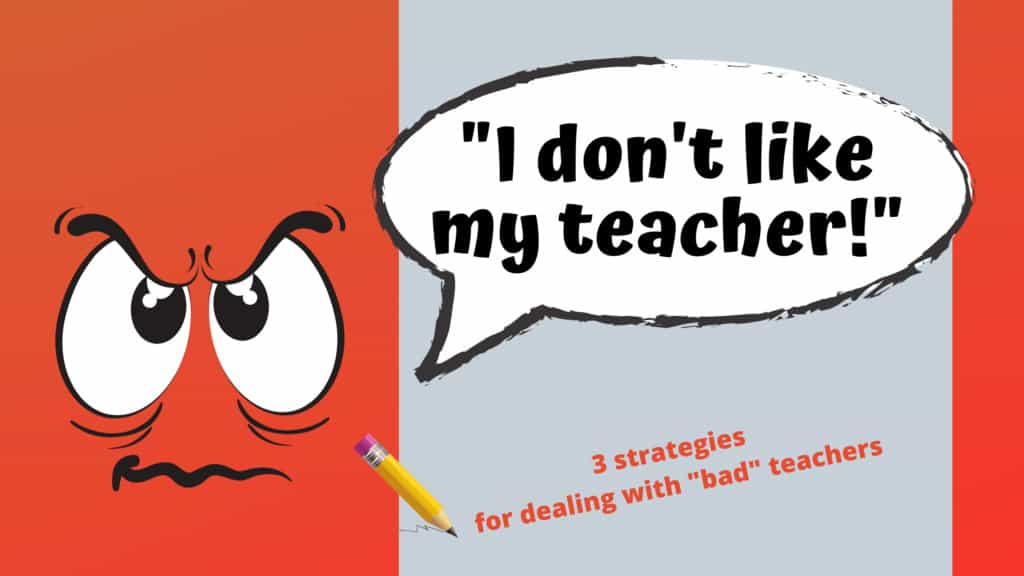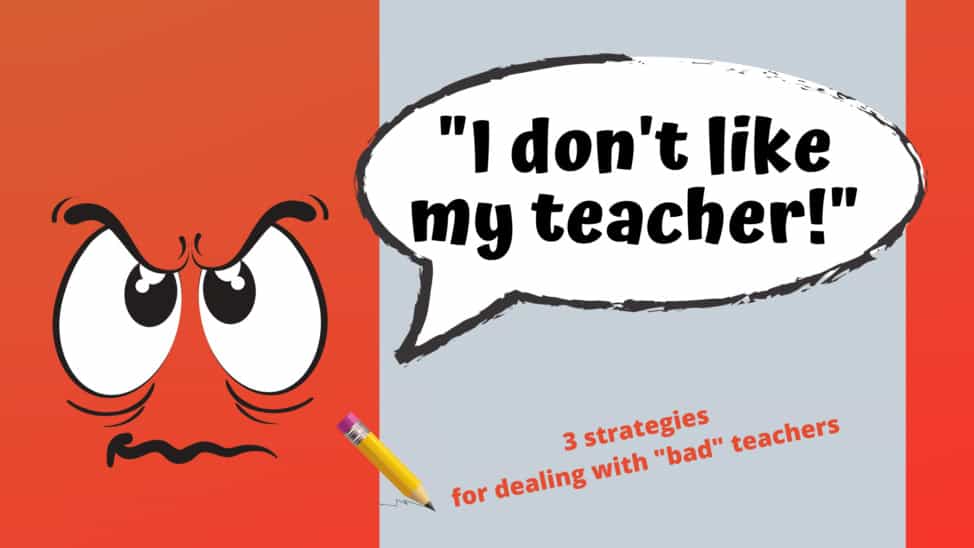
By Katie Azevedo, M.Ed.
“I don’t like my teacher.” I hear this all the time, and I get it.
My favorite teacher in the whole world was my second grade teacher because she took me to the fifth grade classroom to borrow cool books.
Somehow, this very same teacher was my sister’s least favorite teacher in the whole world.
My point: what makes a teacher “good” or “bad” doesn’t always have anything to do with the teacher. Sometimes our perception of a teacher as good or bad is simply a reflection of our personal preferences, personalities and learning styles.
Sure, there are some legitimately bad teachers out there who would be better off in other professions. But there are also bad plumbers and bad Uber drivers and bad everythings. Such is life. [End blog post here. Jk.]
Here’s the thing: if you get a bad plumber, you can call a different one next time. If you get a bad Uber driver, call your mom next time.
If you get a bad teacher, however, you can’t just swap him or her out for another one. If you get a “bad” teacher, it’s on you to handle it.
If your excuse for everything going poorly in your class is “it’s my teacher’s fault” or “my teacher is sooo bad,” then use the 3 strategies below to survive.
How to deal with “bad” teachers
The following 3 strategies can help you get through a class being run by a “bad” teacher. If it’s not the teacher who’s the issue, and it’s the class you hate, then you want to use these 6 strategies here.
1. Stop blaming them.
I’m not saying that your teacher is always right. I’m a teacher and I’m definitely not always right. (That’s because I’m a mere mortal.) But it’s highly (highly!) unlikely that every single issue you’re having in class is your teacher’s fault.
Own what you can own. In other words, is your teacher actually “bad” because she didn’t accept your essay 3 weeks late? Really? Is your teacher actually “mean” because she finally got annoyed after asking you nicely to stop talking … three times? Really?
Now, of course, some things are beyond your control, such as the teacher’s teaching style and how they manage their classroom. If you’re dealing with a disorganized teacher who doesn’t grade work on time, loses assignments or regularly mixes up deadlines, that’s something different and you’ll likely need these 6 strategies.
2. Avoid their triggers.
There’s a good chance that you know exactly what to say or do to upset your parents. Or you know just what buttons to push to annoy the bejeezes out of your sister. Am I right? I’m right.
Same goes with your teacher: If you know what really bothers your teacher, even if you don’t agree with it or understand it, then don’t do those things.
For example, I had a student recently (true story here) who was upset about losing 10 points on his essay because he didn’t use Times New Roman size 12. We looked at the rubric together, and right there – clear as day – it specified that the final essay had to be in Times New Roman size 12.
But this student was putting up a fight, arguing that the teacher was mean and unfair. Really? Reeaally?
Sure, I don’t personally care what font a student uses as long as it’s not Wingdings or something equally ridiculous. And I also don’t care if a student submits to me an essay in size 11 or size 12 font. But if your teacher DOES care, then just do what she’s asking for. Don’t agree with it? Do it anyways. (Love, Mom.)
Bottom line is this: Avoid annoying your teacher and pressing her buttons, even if you don’t understand her rational or even if your other teachers are perfectly fine with the exact same triggers.
3. Learn their style.
All teachers have their unique way of doing things, and the sooner you “learn” your teachers, the better. Some have preferences for communicating with students (email, during class, staying after school, using office hours, etc.), others have unconventional ways of grading, others have their own policies for accepting / not accepting late work, and the list goes on.
You might find yourself thinking you don’t like your teacher when you actually just haven’t identified or adapted to their systems yet.
How do you “learn” your teacher? First, start with the class syllabus; usually class policies are listed clearly there.
Second, learn from your mistakes: if you turn in a paper late and she doesn’t accept it, now you know that you cannot turn in late papers. If she doesn’t reply to your email (here’s the right way to email your teacher), then now you know you should communicate with her after class.
You could also ask other students who have had the same teacher before. It doesn’t hurt to reach out and see if previous students have any tips for how to deal with this “bad” teacher.
I don’t like my teacher: Final notes
These 3 tips are meant to help you deal with teachers whose teaching methods, styles and personalities just don’t match your preferences. Yes, having a “bad” teacher can be annoying and difficult, but learning to adjust is the key takeaway here.
It’s important to learn these skills early on, so that “I don’t like my teacher” doesn’t turn into “I don’t like my boss” and eventually into “I don’t like anyone who does things differently than how I want them done.”

